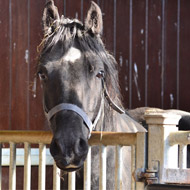
Investigation reveals extent of online horse trade
National pet charity Blue Cross is calling on the government to look closer at the problems horse owners face when buying and selling online.
The call follows an investigation by the charity which revealed that selling a horse online is becoming increasingly commonplace.
Blue Cross recruited a team of volunteers to track six equine websites and Facebook, over a period of 12 weeks from August to November of 2017. Some 3,349 unique selling adverts were tracked over this time and the contents analysed.
“Selling a horse online appears to be an emerging market,” says Blue Cross education officer Kerry Taylor. “On 22 August alone there were 8,061 ads selling one or more horses on the six classified sites we tracked.”
While 76 per cent of all adverts described a riding horse or pony, 28 per cent of all adverts used terminology that implied the horse was not straightforward, needed work, was young and inexperienced, or displayed behavioural problems.
“Although this might not cause a problem for an experienced, knowledgeable home, it could make it hard to assess the horse accurately in a short period of time when looking to buy,” said Kerry. “This could lead to buyers purchasing a horse that is unsuitable for them, raising concerns about the future welfare of such animals and potential safety risks for the purchasers.”
Blue Cross also found that the promotion of breeding is a cause for concern in online advertisements. Although the number of horses listed with a potential use for breeding was small (one per cent) the quality of such adverts flagged health and welfare concerns.
One mare advertised as suitable as a companion or broodmare was described as permanently lame with a previously broken pelvis rendering her unrideable. However, the advert went on to say that ‘it doesn’t impact on her ability to be bred from and she foaled fine this year with no assistance.’
Kerry added: “Blue Cross is urging government to address the growing issues around the online sale of pets and look more closely at the particular problems horse owners face when buying and selling online and the subsequent welfare concerns that can arise.
“Education is also key to tackling this problem and we hope our research and advice will encourage new horse owners to make a more informed choice.”



 The Federation of Independent Veterinary Practices (FIVP) has announced a third season of its podcast, Practice Matters.
The Federation of Independent Veterinary Practices (FIVP) has announced a third season of its podcast, Practice Matters.